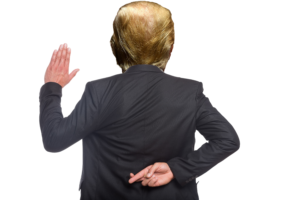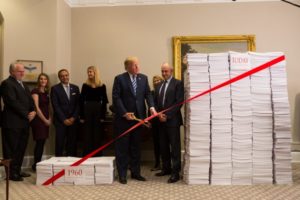The Deregulatory Dictionary: Defining Anti-Regulatory Buzzwords Used by the Right
Words, Phrases and Euphemisms That Disguise Attacks on Workers, Consumers, Families and Our Environment
By David Rosen and Matt Kent

With President Donald Trump’s war on regulation kicking into high gear, corrupt administration officials, anti-regulatory ideologues and industry lobbyists are eager to hide what they’re up to and how it will harm the public.

Often, the way the right disguises and evades responsibility for attacks on workers, consumers, families and our environment is by using euphemistic language or technical jargon to obscure their true aims.
Public Citizen’s regs team has noticed a proliferation of these deregulatory buzzwords in the public discourse, most of which have been carefully focus-grouped and poll-tested to make deregulation sound helpful and productive – or at least dry and innocuous.
But nothing could be further from the truth, since we’re talking about dismantling safeguards that protect our families and communities from harm.
Here’s a short “deregulatory dictionary” we’ve put together to help you understand what these terms really mean.
Balanced Regulation. When regulators are expected to treat corporate profits as more important than public health, safety and our environment.
Big Government. A derogative term for any government action that would force corporations to protect their customers or the public from harm.

Bureaucracy. A derogative term for civil servants who’ve dedicated their careers to protecting the public from industry greed and abuses.
Command-and-Control. A derogative term for any government policy that compels industry to change its operations to make them safer – something industry seldom likes, usually because it cuts into profits.
Cost-Benefit Analysis. Calculation of all the costs to industry, using numbers from industry that clearly have been exaggerated, but typically discounting many of the real benefits to the public. A.k.a. cost-only analysis.
Deconstructing the Administrative State. Permanently ending the ability of the executive branch to protect the public through sound regulation and enforcement.

Deregulation. Ditching safeguards that already are on the books to protect corporate predators from the public rather than the other way around.
Economic Freedom. Allowing private industry to do whatever it wants, regardless of how it harms the public and our environment.
Eliminating Redundant Provisions. Making sure corporations have to answer only to one watchdog agency, almost always the one least likely to police their bad behavior.
Innovation. A buzzword commonly used when industry wants to exempt new technologies and services from public oversight, no matter how dangerous or destructive they might be.
Market-Based Solutions. When there is little or no public oversight of corporate behavior – allowing “the market” to foster more exploitation, wrongdoing and corruption.
Modernize. Get rid of longtime protections that still make sense for the public.
Nondelegation Doctrine. The preposterous theory that one branch of government (i.e. Congress) cannot direct another (i.e. the executive branch) to carry out the law.

OIRA. Acronym (pronounced “oh-EYE-ruh”) for the U.S. Office of Information and Regulatory Affairs. OIRA is a White House agency that would really like to hear from lobbyists interested in blocking, delaying and watering down regulatory protections that have been proposed. The office has been nicknamed, “the most powerful federal agency you’ve never heard of,” because it functions as a clearinghouse for much of the regulatory activity in the executive branch. It is administered by the White House “regs czar.”
Outdated Requirements. Longstanding protections that industry can portray as outdated but in reality are still needed.
Preemption. When a weak federal law or standard overrides a stronger state or local one.
Red Tape. A derogative term for indispensable consumer, worker and environmental protections that cut into corporate profits.
Regs Czar. A nickname for the administrator of the White House regulatory office, OIRA.
Regulatory Dark Matter. A derogatory term that refers to non-binding guidance documents that clarify how companies can best comply with regulations.
 Regulatory Reform. Making the regulatory process more complex and adding new analytic requirements to bog down the process – thereby limiting agencies from enacting and enforcing strong public protections.
Regulatory Reform. Making the regulatory process more complex and adding new analytic requirements to bog down the process – thereby limiting agencies from enacting and enforcing strong public protections.
Regulatory Sandbox. A get-out-of-jail-free zone that lets industry experiment with new ways of increasing profits at the public’s expense.
Self-Regulation. Letting companies police themselves without any public oversight.
Streamline. Weaken or eliminate public protections.
Making sure everyone knows what’s really at stake when they hear words like “cutting red tape” is essential in our fight to ensure that the public and our environment receive greater, not less, protection.
Please share this “Deregulatory Dictionary” with your friends, family and activist allies, and follow us on Twitter at @goodregs.